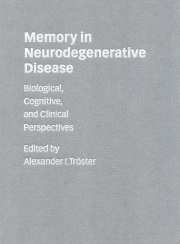Book contents
- Frontmatter
- Contents
- List of contributors
- Preface
- PART I Biological perspectives
- PART II Cognitive perspectives
- PART III Clinical perspectives
- 14 Biological and psychosocial risk factors for dementia and memory loss
- 15 Cross-cultural issues in the neuropsychological assessment of neurodegenerative disease
- 16 Psychometric issues in the clinical assessment of memory in aging and neurodegenerative disease
- 17 The role of memory assessment in the preclinical detection of dementia
- 18 Clinical differentiation of memory disorders in neurodegenerative disease
- 19 The impact of depression on memory in neurodegenerative disease
- 20 Preserved cognitive skills in neurodegenerative disease
- 21 Drug treatment of cognitive impairment in neurodegenerative disease: rationale, current experience and expectations for the future
- 22 Surgical interventions in neurodegenerative disease: impact on memory and cognition
- 23 Memory dysfunction in neurodegenerative disease: ethical and legal issues
- 24 Memory in neurodegenerative disease: clinical perspectives
- Index
19 - The impact of depression on memory in neurodegenerative disease
from PART III - Clinical perspectives
Published online by Cambridge University Press: 23 November 2009
- Frontmatter
- Contents
- List of contributors
- Preface
- PART I Biological perspectives
- PART II Cognitive perspectives
- PART III Clinical perspectives
- 14 Biological and psychosocial risk factors for dementia and memory loss
- 15 Cross-cultural issues in the neuropsychological assessment of neurodegenerative disease
- 16 Psychometric issues in the clinical assessment of memory in aging and neurodegenerative disease
- 17 The role of memory assessment in the preclinical detection of dementia
- 18 Clinical differentiation of memory disorders in neurodegenerative disease
- 19 The impact of depression on memory in neurodegenerative disease
- 20 Preserved cognitive skills in neurodegenerative disease
- 21 Drug treatment of cognitive impairment in neurodegenerative disease: rationale, current experience and expectations for the future
- 22 Surgical interventions in neurodegenerative disease: impact on memory and cognition
- 23 Memory dysfunction in neurodegenerative disease: ethical and legal issues
- 24 Memory in neurodegenerative disease: clinical perspectives
- Index
Summary
INTRODUCTION
The widely held notion that depression exerts a negative impact on cognition is not novel: ancient Egyptian writings already noted the coexistence of mood disorders and impaired cognition (Loza and Milad 1990). Despite extensive study, however, the extent, nature and underlying mechanisms of depression's influence on cognition remain relatively poorly understood. If one views the effects of depression on cognition as falling on a continuum, it is generally evident that individuals with dysthymia or only mild-to-moderate depressive symptomatology, despite their subjective complaints of memory impairment, demonstrate little, if any, objectively verifiable cognitive impairment. At the other extreme of the continuum, major depression can lead to such pervasive cognitive dysfunction, accompanied by impairments in occupational and social functioning, that an individual is diagnosed as having a dementia syndrome.
This dementia syndrome associated with depression is known by a plethora of appellations (e.g. dementia syndrome of depression, pseudo-dementia, depressive dementia, reversible dementia caused by depression). Not typically considered under the rubric of neurodegenerative diseases and not per se the focus of this chapter, the dementia syndrome of depression nonetheless raises some important issues concerning the etiology, diagnosis and treatment of memory impairment in neurodegenerative diseases. In particular, given the apparent coexistence of depression and neurodegenerative diseases, as well as an overlap in the cognitive impairments associated with major depression and neurodegenerative diseases, several questions of practical importance arise: Is depression a risk factor for, or harbinger of dementia? Is depression a consequence of neurodegeneration, or is it a reaction to the diagnosis and/or limitations in activities of daily living brought about by the disease?
- Type
- Chapter
- Information
- Memory in Neurodegenerative DiseaseBiological, Cognitive, and Clinical Perspectives, pp. 314 - 337Publisher: Cambridge University PressPrint publication year: 1998
- 3
- Cited by



